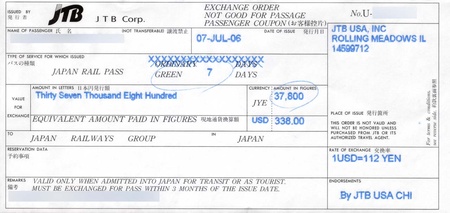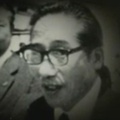For Japanese who have emigrated overseas, that is, the first generation, visiting Japan after emigrating has a special meaning. It is not only a way to update relatives and friends living in Japan and renew old friendships, but also a kind of "ritual" to reaffirm the "connection" with Japan in one's life. For relatives and friends in Japan, it is also a very good opportunity to look back on human relationships across the sea.
Has Japan become far away?
The Japan Rail Pass is a short-term travel pass for foreign nationals visiting Japan that began selling after the launch of the JR Group in 1987. There are several types, but the cheapest one is for use in a regular car and is valid for 7 days, and costs 29,110 yen. During the validity period, you can ride all the JR train lines, some JR bus lines, and even the Miyajima ferry route. (For reference, the current regular fare for a reserved seat in a regular car on the Tokaido Shinkansen between Tokyo and Shin-Osaka is 14,450 yen one way.) Japanese nationals are allowed to purchase the JR Pass as a "special case" if they meet certain conditions, such as obtaining permanent residency in the country they have immigrated to or marrying a native of the country they have immigrated to. There was a commotion surrounding this "special case" from the end of 2016 to the spring of 2017.

In November 2016, JR companies announced a policy that as of March 31, 2017, they would no longer allow Japanese people to purchase JR passes. The main reason cited was that ticket counter and ticket gate operations had become complicated. In fact, JR passes cannot be used at automated ticket gates, so tickets must be checked by station staff. Furthermore, when purchasing reserved seat tickets, automated ticket vending machines cannot be used, and tickets must be issued at a ticket counter attended by a staff member. In Japan's railway industry, where there is constant pressure to reduce labor costs, the "true intention" is to abolish the sale of these types of tickets. 1
The first to react to JR's "decision" was the Brazilian Japanese community, where many first-generation Japanese immigrants emigrated after the war and where many first-generation Japanese are still active today. Japanese newspapers such as the São Paulo Shimbun and the Nikkei Shimbun ran extensive articles about the matter, leading to a variety of opinions from many first-generation Japanese.
One Issei expressed sadness, saying that not being able to purchase JR passes would mean higher expenses and that "my homeland feels far away." Another expressed anger, saying that it was unforgivable that the JR companies were trying to write off migrants, despite the various policies the Japanese government is implementing to make Japan a tourism-oriented nation, and that this goes against the spirit of "omotenashi." The president of one prefectural association sent a petition to JR East (East Japan Railway Company) to persuade the JR companies to change their mind, but was disappointed to receive a response that "the JR pass is for people of foreign origin, and is not designed with Japanese people in mind." Furthermore, some people said that Japanese migration to Brazil was largely due to national policy, and that migrants are also "civilian ambassadors," and that the JR companies should take this into consideration before continuing to sell JR passes to Japanese people.
These did not remain merely voices, but developed into a social movement. The first generation of Brazilians took the lead in proactively petitioning the Japanese government and the various JR companies. They also appealed via the Internet, gaining support not only from within Brazil, but also from Japanese who had emigrated to various parts of the world. Furthermore, when Satoru Sato, the Japanese ambassador to Brazil, visited the Ministry of Land, Infrastructure, Transport and Tourism of Japan, he directly requested the Minister to reconsider the decision.
Meanwhile, within Japan, a different "reaction" was seen than in the Japanese community. The majority of people who use JR companies are Japanese people living in Japan, and many people said that it is absolutely unacceptable to ignore the existence of these essential "regular customers," and that Japanese people living in Japan should be given more preferential treatment. JR companies used to sell many round-trip tickets with high discount rates, but most of these have now been discontinued, with the exception of the "Seishun 18 Ticket," which is only on sale during long holiday periods. Due to the declining population and the resulting decline in railway business revenue, JR companies are very reluctant to sell discounted or round-trip tickets. 2
Some Japanese have strongly criticized the move, alleging that Japanese people living overseas have "vested interests." Some have said that selling discounted JR passes only to foreigners is "reverse discrimination." However, I believe that such opinions stem from a lack of awareness of the actual situation of users and the historical background, and I strongly refute them. In fact, many Japanese are unaware that quite a number of Japanese people who use JR passes play an important role as "guides," supporting foreign visitors to Japan. If Japanese people living overseas are no longer able to purchase JR passes, I believe it will be a blow to the Japanese government, which is aiming to make Japan a tourism-oriented nation, and to local business circles that are counting on revenue from tourists from overseas. 3
A new development occurred in the commotion surrounding the JR Pass on March 31, 2017. In response to numerous petitions and requests from various quarters, as well as requests from the government, which has made Japan a tourism-oriented nation as its national policy, JR companies retracted their initial decision and announced that they would continue to allow Japanese nationals to purchase JR Passes until the end of 2020, when the Tokyo Olympics will be held. Furthermore, in September 2017, the government revealed that it was considering selling a "Japan Expressway Pass," an expressway version of the JR Pass. It appears that preparations are steadily being made to make it easier for people of foreign origin, and even Japanese nationals living abroad, to visit Japan. 4
Although the JR Pass is extremely limited, valid only until the Olympic year, many people in the Japanese community in Brazil and other related parties expressed a certain degree of understanding and relief at this decision. One Issei said that since JR Passes will still be available in the future, he would like to visit Japan again before he dies to watch the Olympics. Another Japanese person who has emigrated overseas was excited about using the JR Pass to take his child, who has never been to Japan, to various places in the country.
Visits to Japan by Japanese who have emigrated overseas are not just a homecoming, but also an important opportunity to pass on Japanese culture to the next generation. No one can deny that the JR Pass plays an important role in this regard. However, I believe that the fact that some Japanese people have raised criticism of the existence of the JR Pass is something that cannot be ignored.
I also believe that the root of the "commotion" over JR passes is the tough business situation of JR companies, which are seeking to further streamline operations and increase profits. Rather than simply refusing to allow the sale of JR passes to some people, they could have changed the terms of use and fares with the understanding of users. I would like JR companies to grasp the actual situation of tourists and immigrants in Japan and reconsider whether to continue selling JR passes after the Olympics, so that first-generation Japanese living overseas can continue to visit Japan easily.
Note
1. " Behind the Scenes of the Revocation of the "JR Pass Unavailable for Japanese Living Abroad" Policy" Toyo Keizai (May 27, 2017)
2. The current Japanese railway industry is strengthening its side businesses such as real estate and retail to fulfill its social obligations as a public transport service while also striving for survival. In urban areas, some railway companies are trying to improve profits by operating so-called guaranteed seat trains (paid commuter liners) during rush hour.
3. Discount tickets for tourists are sold not only in Korea but also in European countries.
4. Based on a press release from the Ministry of Land, Infrastructure, Transport and Tourism .
© 2017 Takamichi Go





